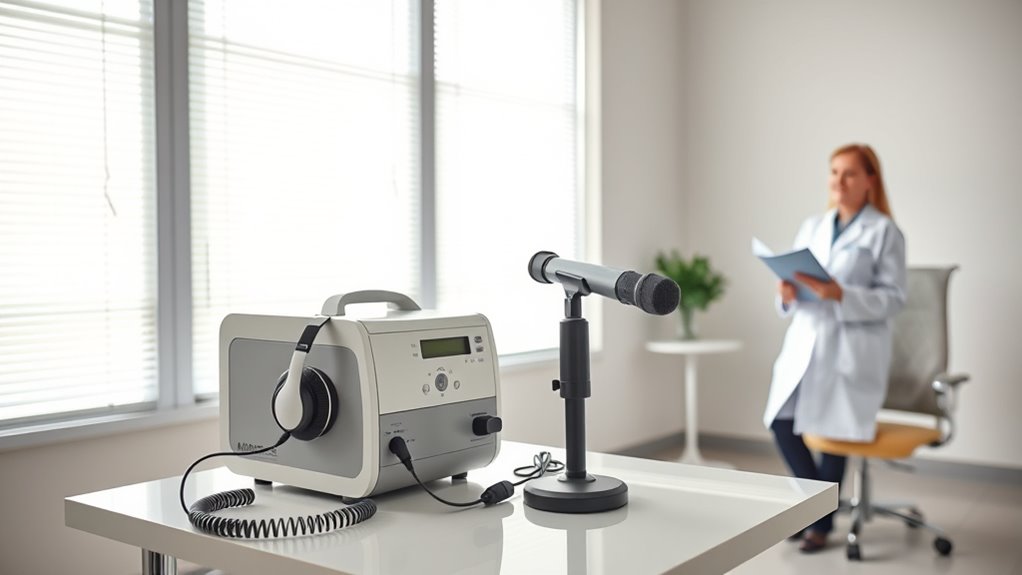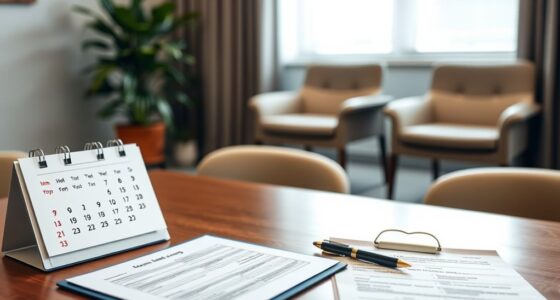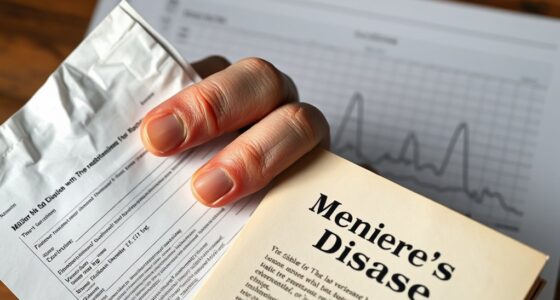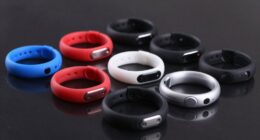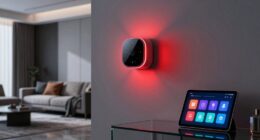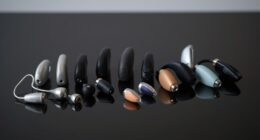On exam day, arrive early to settle in and follow any specific instructions your provider gave. Protect your ears from loud noises before the test to prevent inaccurate results by using earplugs if needed. Wear comfortable clothing, and don’t wear headphones or earplugs unless told otherwise. Be honest about your hearing history and bring previous test reports. Staying relaxed and attentive helps guarantee accurate results—keep going to learn more tips for a successful exam.
Key Takeaways
- Arrive early, wear comfortable clothing, and follow any pre-test instructions to ensure a smooth exam process.
- Avoid loud noises and protect your ears with earplugs if exposed to noise before the exam.
- Bring previous hearing test results and relevant medical notes to provide comprehensive background.
- Follow audiologist instructions carefully, including wearing or removing hearing aids as advised.
- Communicate any discomfort or concerns during testing to help ensure accurate and reliable results.

Preparing for your C&P audiology exam can feel overwhelming, but knowing what to expect and how to get ready can make the day much smoother. One of the most significant aspects of exam preparation is guaranteeing your hearing health is in good shape beforehand. This means avoiding exposure to loud noises prior to your appointment, which can temporarily affect your hearing test results. Using hearing protection like earplugs in noisy environments helps protect your ears and guarantees that your test results reflect your typical hearing ability. Being mindful of your hearing protection is essential because recent loud noise exposure can lead to inaccurate assessments, potentially delaying your claim process or leading to unnecessary follow-up tests.
Avoid loud noises before your exam to ensure accurate hearing test results and a smoother claim process.
On the day of your exam, it’s smart to arrive early so you have time to settle in and review any instructions provided. Wear comfortable clothing and avoid wearing headphones or earplugs unless specifically instructed, as these can interfere with the testing process. Remember, the audiologist will conduct a series of assessments, including pure-tone and speech tests, to evaluate your hearing sensitivity. To get the most accurate results, follow any pre-test instructions given, such as refraining from caffeine or certain medications if advised. Staying well-hydrated and rested can also help improve your focus during the exam.
Your preparation should include gathering any relevant medical information, such as previous hearing test results, audiology reports, or notes from your healthcare provider. This information can help the audiologist better understand your hearing history and provide a detailed evaluation. If you wear hearing aids or assistive devices, ask whether to wear them during the test; often, they are removed during the assessment to measure natural hearing. Communicate openly with the examiner if you experience discomfort or have specific concerns, as this can influence the testing process and results. Additionally, understanding Bitcoin IRA concepts such as market fluctuations and investment strategies can help you stay informed about broader financial considerations related to your hearing health and insurance claims.
Finally, remember that your attitude during the exam matters. Stay calm and focused, listen carefully to instructions, and don’t rush through the tests. Hearing protection is essential not just before the exam but also after, especially if you work in noisy environments. Proper exam preparation, combined with good hearing protection habits, ensures your hearing evaluation is accurate and helpful for your claim. By taking these simple steps, you’ll make the process smoother, more efficient, and ultimately more beneficial for your health and benefits process.
Frequently Asked Questions
How Early Should I Arrive for My Audiology Exam?
You should arrive at least 15 to 30 minutes early for your audiology exam. This allows you to guarantee appointment punctuality and complete any necessary exam preparation without feeling rushed. Arriving early helps you relax, review instructions, and gather any needed documentation. Being prompt shows respect for the examiner’s time and sets a positive tone for the exam, making sure everything proceeds smoothly.
What Should I Bring to the Appointment?
You should bring your ID, any hearing protection you use, and a list of medications. Ironically, forgetting these might mean a longer wait or needing to reschedule—so don’t leave them at home! Your hearing protection is essential if you’re sensitive to sound, and medication info helps the audiologist interpret your results accurately. Pack everything the day before to avoid scrambling last minute.
How Long Does a Typical Audiology Exam Take?
A typical audiology exam usually takes about 1 to 2 hours, depending on the test duration and exam components involved. You can expect a series of assessments, such as pure-tone testing, speech recognition, and possibly tympanometry. The process is thorough but efficient, ensuring everything is covered properly. Be prepared for some waiting time if additional tests are needed, and wear comfortable clothing to make the experience smoother.
Are There Any Preparations Needed Before the Exam?
Imagine you’re preparing for your C&P audiology exam; you’ll want to review the pre-test checklist beforehand. You should make certain you arrive well-rested, avoid loud noises before the test, and bring any necessary documentation. Pre exam expectations include arriving early and following instructions from the audiologist. By completing these preparations, you’ll help ensure accurate results and a smooth exam experience, so don’t forget to check your pre test checklist and get ready!
What Should I Do if I Experience Discomfort During the Test?
If you experience discomfort during the test, tell the examiner right away. They can modify the test environment or your position to help manage your discomfort. Don’t hesitate to communicate openly—your comfort is important for accurate results. Focus on deep, steady breaths to stay calm. Remember, addressing discomfort promptly ensures better test outcomes and a smoother experience for you.
Conclusion
On exam day, staying organized and calm guarantees you get accurate results. Imagine a veteran, James, who arrived prepared with his medical history and questions, making his appointment smooth and efficient. By following these best practices, you help your audiologist assess your hearing accurately, leading to better care. Remember, your proactive approach can make all the difference—so arrive prepared, communicate clearly, and trust the process for the best outcome.

